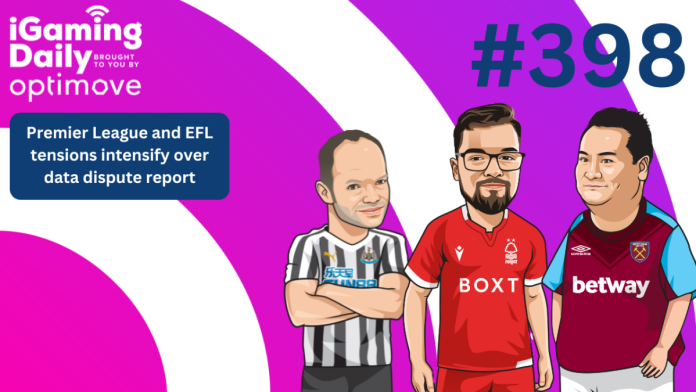Media speculation suggests that a dispute may be in the works between the Premier League and the English Football League (EFL) over the revenue share split of data rights.
On the latest episode of iGaming Daily, supported by Optimove, Martyn Elliott was joined by SBC’s Content Director, Ted Menmuir, and Ted Orme-Claye, Editor of Insider Sport, to delve into the dispute.
Currently, the Premier League and the EFL are equal shareholders in FootballDataCo, the system’s football data rights holder. The data is then subsequently sold to media outlets and betting operators and the revenue is split evenly between the two entities.
Orme-Claye explained that now The Guardian reports that several unnamed top-flight clubs are lobbying to take a greater share of revenue as they argue the Premier League commands more of a betting interest than the lower leagues governed by the EFL.
On why data has become such a valuable commodity, Orme-Claye said: “The reason data has come to the forefront is because of two main reasons, one of which is betting.
“The Premier League and football in general really has become the most bet-on sport. It’s become such a huge revenue generator for these clubs through betting data rights which are sold not just domestically, but also internationally.
“The other side of it relates to media rights. Media companies are increasingly big consumers of data as well because they use it to inform storytelling and inform punditry and analysis. You watch things like Match of the Day or any football-orientated show and they’ll be showing statistical breakdowns. As a result, it has become an increasingly valuable commodity for the football clubs and leagues themselves.”
Menmuir added that, if the reports turn out to be well-founded, it suggests that the Premier League’s aim appears to be to try to “control every commercial dynamic of English football”.
Also on the horizon for clubs across the English system is the potential implementation of recommendations made by the Football Governance Bill, headlined by the creation of a football regulator.
Part of the regulator’s remit will be to scrutinise the financials of clubs and as a result, Orme-Claye explained, it is inevitable that clubs will become more protective of commercial assets such as data.
“I think it’s all about how you can commercialise your assets and how you commercialise every component of your football club, regardless of the division you’re in,” added Menmuir.
“The more commercial strings you attract, the higher the value of your assets, it really is a cold-hearted business now football.”





